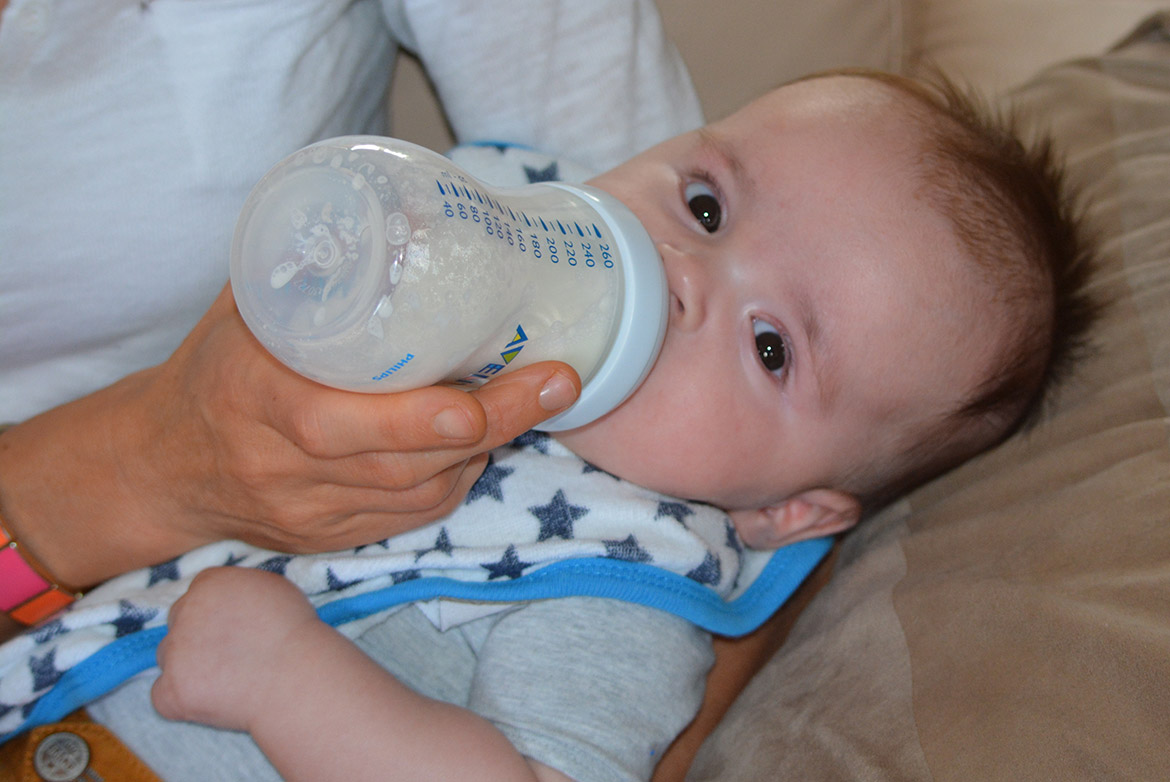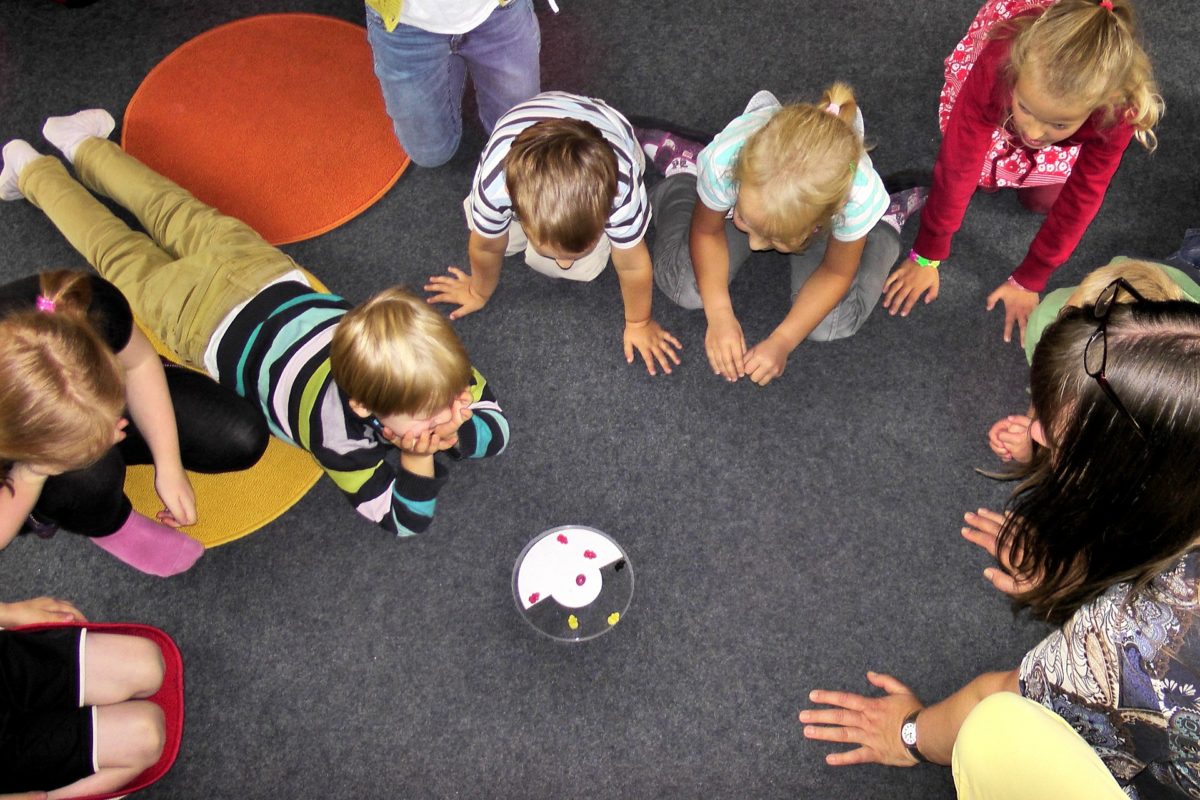Janine is the mom of a 3-and-a-half-year old son and a 10-months old daughter. She lives in Germany with her family. She and her husband, both native speakers of German, do one-parent-one-language (OPOL) to raise their children bilingually. Janine speaks English to the children—a language that became second nature for her after living in the U.K. for 8 years. In the interview, Janine addresses some key challenges, especially emotional ones, that came up unexpectedly when she first tried to speak to her children in English.
Location: Germany
Parents: Mom=English; Dad=German
Children: Son (3.5 yrs) and daughter (10 month)=German & English
_________________________________________________________________________________
Veronika: Thanks for doing this interview! My first question for you: what is the language situation in your family? In other words, who speaks what to whom and when?
Janine: We are based in Germany and my native tongue is German. I grew up in Germany but I lived in the UK for about 8 years. I speak English to my now 3.5 and a half year old son, Jonne, and I have also started to speak English to Liva, my daughter who is now 10 months old. I’m the only one speaking English and everyone else is speaking German.
Veronika: Okay. So you do what is called “additive bilingualism”?
Janine: Yes. We basically decided that we wanted to raise our children with an additional language.
Veronika: What led you to that decision?
Janine: Well, let me explain why I’m speaking English to the children.
Veronika: Sure.
A close connection to the English language
 Janine: I was married to a British man before. That’s why I lived in the UK. And we couldn’t have children together. But if I had had children back then it would have been important to me that I would speak German to them so that my family and my friends would be able to speak with them. So this whole thing about bilingualism was always on my mind in regards to having children. When we split up I returned to Germany. The idea of having children and raising them bilingually faded for a while. But then, when I found out I was pregnant with my son, that whole thing about raising him bilingually came to mind again. At the time I was still working for a British company so I used English every day and my mind was switching between English and German. I really enjoyed speaking English.
Janine: I was married to a British man before. That’s why I lived in the UK. And we couldn’t have children together. But if I had had children back then it would have been important to me that I would speak German to them so that my family and my friends would be able to speak with them. So this whole thing about bilingualism was always on my mind in regards to having children. When we split up I returned to Germany. The idea of having children and raising them bilingually faded for a while. But then, when I found out I was pregnant with my son, that whole thing about raising him bilingually came to mind again. At the time I was still working for a British company so I used English every day and my mind was switching between English and German. I really enjoyed speaking English.
So back to my point, when I got pregnant, I thought about raising him bilingually—even though English is not my native tongue. I did a bit of research, but there wasn’t a huge amount that I came across. Mostly what I found said “don’t do it” because you show children the wrong English, wrong grammar, wrong accents and so on. So I was a little bit discouraged. But then I found one book. It was Mut zur Mehrsprachigkeit: So erziehe ich mein Kind in einer Fremd- oder Zweitsprache by Inés María Jiménez. I got it secondhand and read it. That book was really positive. So I decided to try it!
At first speaking English felt unnatural
 But when my son arrived, I couldn’t do it. It was like “No, I can’t speak English.” I kept trying but it felt really strange. At the beginning I needed to speak German. I think it had to do with German being my mother tongue. It was the deeper, emotional connection or something like that. But then when he was about 4, 5 or 6 months old—I can’t remember how old he was exactly—I met someone who had almost the same story. She was married to a Dutch man and then later moved back to Germany and married a German. She then started speaking Dutch to her children. She was the one urging me “Please do it” and “You give your children something”. She was really encouraging and I think I just needed that push. So at some point I said, “Okay! I’ll give it a try and if it doesn’t work, then at least I can tell my son that I tried when he stands in front of me a few years down the line and says, “I don’t want to learn English vocabulary at school.” [laughs]
But when my son arrived, I couldn’t do it. It was like “No, I can’t speak English.” I kept trying but it felt really strange. At the beginning I needed to speak German. I think it had to do with German being my mother tongue. It was the deeper, emotional connection or something like that. But then when he was about 4, 5 or 6 months old—I can’t remember how old he was exactly—I met someone who had almost the same story. She was married to a Dutch man and then later moved back to Germany and married a German. She then started speaking Dutch to her children. She was the one urging me “Please do it” and “You give your children something”. She was really encouraging and I think I just needed that push. So at some point I said, “Okay! I’ll give it a try and if it doesn’t work, then at least I can tell my son that I tried when he stands in front of me a few years down the line and says, “I don’t want to learn English vocabulary at school.” [laughs]
Veronika: Shifting languages at 6 months of age probably wasn’t an issue for your son, right? But was it much of an emotional hurdle for you?
Janine: I don’t think my son noticed much of a change judging from the expression on his face. I think at that point he was very interested in whatever came out of our mouths and he didn’t start crying or anything. He was fine with that.
I tried speaking English, but I just couldn’t do it…
 For me, it took some time getting used to it. I tried speaking English one day and I just couldn’t do it. It sort of ‘took stages’ of getting over that initial embarrassment or strange feeling that I had in front of my husband. Obviously, he always listened and had to get used to it as well. But then at some point, it became second nature. It became totally normal and my brain adapted to it. Well, ever since, we have been on that journey and it’s been fun.
For me, it took some time getting used to it. I tried speaking English one day and I just couldn’t do it. It sort of ‘took stages’ of getting over that initial embarrassment or strange feeling that I had in front of my husband. Obviously, he always listened and had to get used to it as well. But then at some point, it became second nature. It became totally normal and my brain adapted to it. Well, ever since, we have been on that journey and it’s been fun.
Veronika: How did it go with your daughter, your younger one? Did you start with English right away or did you also have the same emotional hurdle to overcome when she was born?
Keeping things engaging and fun…
Janine: It was pretty much the same… I’ve only now started as she is a bit older. She’s 10 months now. It took me until she was 7 or 8 months until I could feel good about speaking English with her. I’m not beating myself up about it. It’s not about proving anything to anyone. For me, it’s about being myself. I think that’s always my key thing that I want the additional language [English] to be fun for everyone, not some kind of crazy, rigid language drill. I think as soon as it gets rigid and forced it gets that sort of “funny aftertaste.” I’m just doing it because I enjoy it.
 Veronika: Yes, keeping language engaging and fun at this early age is critical. Children need to form a positive relationship with that additional language. Being too rigid about it, in my view, can be counterproductive—and ultimately even have a negative impact on your family life.
Veronika: Yes, keeping language engaging and fun at this early age is critical. Children need to form a positive relationship with that additional language. Being too rigid about it, in my view, can be counterproductive—and ultimately even have a negative impact on your family life.
So within the first 7 months after your daughter was born, did you switch between talking to your son in English and speaking German to your daughter or how did you make that work?
Janine: I tended to switch and eventually my son noticed it. That was what pushed me to start speaking English to both of them.
Acceptance by the larger family
 Veronika: How did your family take the decision that you speak English to your children? You mentioned that at some point you had to justify that decision. I know that there are several misconceptions about raising children with multiple languages—especially when you are a non-native speaker of the language. Did they accept it easily?
Veronika: How did your family take the decision that you speak English to your children? You mentioned that at some point you had to justify that decision. I know that there are several misconceptions about raising children with multiple languages—especially when you are a non-native speaker of the language. Did they accept it easily?
Janine: Yeah, I think they have misconceptions. Some people in my family may have just rested the case by now. Someone quite close to my heart was probably most against it. I was really, really hoping that this person would speak the German dialect, Plattdeutsch [low German] to my son. I’m really gutted that they didn’t speak it with me when I was a child. I would love to be able to speak it. I can understand it because I heard it all the time but I can’t speak it. I would have loved for this person to speak low German with my kids. But I think there is still a bit of that “old mentality.” When the older generation was at school, they were told that the parents should not speak the low German dialect at home because it was supposedly bad for spelling and all that kind of thing. It’s unfortunate but all the old beliefs are still very much entrenched. When I asked “Oh, can you speak Plattdeutsch with him?” the answer was that three languages were definitely too many. So bottom line, I think this person still finds it silly that I speak English and doesn’t really understands why I do it.
Veronika: That’s unfortunate! Three languages should not be a problem.
Janine: Exactly. That’s exactly how I feel. I think my children could have gotten to terms with Plattdeutsch as well. Anyway, to answer your question: I kept at it regardless and the family has come to terms with it.
Veronika: Other than having to justify your decision for multiple languages, are there any other challenges that you have encountered when raising your children bilingually as a non-native speaker?
Children have to have a need to speak the language
Janine: Yeah, I mean obviously this whole ‘need thing’.
Veronika: You mean that children have to have a need or reason to speak a language?
 Janine: Yes, I think that’s something I learned through reading your blog. When Jonne started kindergarten, I noticed that the language dynamics have changed. Obviously, the amount of exposure to English has changed because now he spends the mornings in kindergarten and not with me. So he doesn’t hear English as much anymore. Also the interaction with other children seems to have an impact. For instance, when I took some of his friends home from kindergarten, I had Jonne and his friends in the car. I wondered how do I do it? Do I speak German to him? Do I speak both English and German? Plus, he answers me in German even though I try to speak English as much as possible. I was wondering why that is…maybe it’s age-related or something like that. In any way, I felt that I had to re-adjust my strategy somehow. So I started to read up on it a little. I realized that I had thought it was just a matter of exposure, but I then learned recently that children have to have a need. Jonne doesn’t really have the need to speak English. So at the moment he’s a pretty passive bilingual. He understands everything, but he basically just answers in German.
Janine: Yes, I think that’s something I learned through reading your blog. When Jonne started kindergarten, I noticed that the language dynamics have changed. Obviously, the amount of exposure to English has changed because now he spends the mornings in kindergarten and not with me. So he doesn’t hear English as much anymore. Also the interaction with other children seems to have an impact. For instance, when I took some of his friends home from kindergarten, I had Jonne and his friends in the car. I wondered how do I do it? Do I speak German to him? Do I speak both English and German? Plus, he answers me in German even though I try to speak English as much as possible. I was wondering why that is…maybe it’s age-related or something like that. In any way, I felt that I had to re-adjust my strategy somehow. So I started to read up on it a little. I realized that I had thought it was just a matter of exposure, but I then learned recently that children have to have a need. Jonne doesn’t really have the need to speak English. So at the moment he’s a pretty passive bilingual. He understands everything, but he basically just answers in German.
Veronika: Yes, he knows you’re speaking German; so why bother, right?
Janine: Yes. I’ve not got a huge problem with it. I mean if it stays like that, then that’s cool. Obviously, I would really like him to be an active bilingual, but I wouldn’t force anything; because there is no real need. I can’t really force it.
Veronika: What you could do to create the need is to spend time with native speakers of English. For example, English playgroups might be an option.
Setting up playgroups
 Janine: Yeah. Unfortunately, we live a little bit outside Hamburg. It’s a little bit more country side. Funnily enough though we have two boys in our neighborhood that are 1 year younger than Jonne. One has a British mum and one has a British dad. They live down the road.
Janine: Yeah. Unfortunately, we live a little bit outside Hamburg. It’s a little bit more country side. Funnily enough though we have two boys in our neighborhood that are 1 year younger than Jonne. One has a British mum and one has a British dad. They live down the road.
Veronika: That’s convenient.
Janine: Yes, I’ve already spoken to the parents. I’m currently thinking of setting up a playgroup myself to just give Jonne some exposure. I think that a lot of ex-pats around here might benefit from it and it would save us from going into the city.
Veronika: Yeah, that’s true. Do you have meetup.com in Germany?
 Janine: Yeah, but its not that popular compared to Facebook with the different groups. But actually a really cool thing I found since I started looking into this whole thing of bilingual development is a Facebook group for Non-native Parents Raising Bilingual/Multilingual Kids. There was a post about German/English and I eventually got invited to a Whatsapp group chat.
Janine: Yeah, but its not that popular compared to Facebook with the different groups. But actually a really cool thing I found since I started looking into this whole thing of bilingual development is a Facebook group for Non-native Parents Raising Bilingual/Multilingual Kids. There was a post about German/English and I eventually got invited to a Whatsapp group chat.
Veronika: Oh nice. Okay.
Janine: Yes, there are many parents from the U.S., from Australia, and the UK, and a few from Germany. It turned out that one family lives only 15 kilometers away! So we recently scheduled a meeting.
Veronika: Oh wow!
Janine: This is really encouraging … I mean I’m really interested to see what is coming of it and how my kids will benefit from it.
Veronika: Yeah. I mean at the very least they develop good listening comprehension in English. Plus, it will probably give them an edge to learn other languages, cognitive advantages and all that.
Kids switch effortlessly between languages
Janine: I think it’s really fascinating to see how my son’s brain already processes the languages. When my husband and I were both on parenting leave, we really noticed it. I was talking to him about the power line overheating and he turns around and switches immediately saying, “Papa, Stromleitung”—even though I did not use the word ‘Strom’ once. He has already paired up the words and I find that fascinating. It’s really interesting to watch and experience that!
Veronika: I hear you! Ella does the same thing. She turns around and says it again in the other language. Sometimes I’m actually surprised where she learned the words.
Bilingual parenting advice: Go for it and have fun!
 Okay, one final question: do you have any advice that you would give to other parents who want to raise their children in a non-native language?
Okay, one final question: do you have any advice that you would give to other parents who want to raise their children in a non-native language?
Janine: That’s a good question. I would say “go for it” and really “go for it” if you can express emotions and connect with that non-native language in the same deep way that you can in your native language. I think a language… that’s not just words. It’s far more than that. It’s what we use to form emotional bonds with our children. That’s probably part of the reason why I couldn’t do it the first few months with both kids. During that initial period, you don’t talk much but the words that you do use are very special. So do it if you feel comfortable with it.
Also, have fun with it. I think that’s the most important thing. If it gets too tight, too rigid, then it doesn’t feel good anymore and it would probably undercut your child’s positive relationship with the additional language. That would be my advice. Go for it and have fun.
Veronika: That’s very good advice! Thank you.


